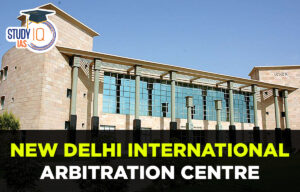Table of Contents
Context: India voted in favour of a UN General Assembly resolution (introduced by France) that endorses the New York Declaration on peaceful settlement of the Palestine issue and the Two-State Solution.
What is the New York Declaration?
- The New York Declaration on the Peaceful Settlement of the Question of Palestine was circulated at a high-level UN conference (July 2025), co-chaired by France and Saudi Arabia.
- It commits the international community to:
- End the war in Gaza through collective action.
- Achieve a peaceful and lasting settlement of the Israeli-Palestinian conflict.
- Implement the Two-State Solution (Israel and Palestine living side by side in peace and security).
- Ensure self-determination for Palestinians while guaranteeing peace and security for Israelis.
| Two-State Solution |
|
United Nations General Assembly (UNGA)
The General Assembly of the United Nations (UNGA) is one of the United Nations’ six main bodies. Given that it serves as the primary decision-making and representative body of the UN, the UNGA is a crucial subject for the IAS examination.
One of the main bodies of the UN is the United Nations General Assembly (UNGA). The United Nations General Assembly (UNGA), the UN’s chief policy-making and representative organ, was established in 1945. Every year, it meets from September to December, and then again between January and August. The headquarters of the UNGA is located in New York.
The Assembly holds its main meeting— the general debate — at the start of each regular session in September, where representatives from each member state are allowed to raise any issues that concern them. It is one of the United Nations’ six primary organs (UN).
| United Nations General Assembly (UNGA) | |
| About UNGA |
|
| Functions |
|
| Sessions |
|
| Powers & Limitations |
|
| Structure |
|
President of the United Nations General Assembly
The current President of the United Nations General Assembly is Annalena Baerbock, a German diplomat and politician. She was elected to preside over the 80th session of the UN General Assembly, which began on September 9, 2025.
Functions of the United Nations General Assembly
It is the UN’s main deliberative, policymaking, and representative organ. It serves as the organisation’s primary governing body and is the UN body with the greatest degree of representativeness. The UNGA, also known as just the GA, is attended by representatives of every UN member. It, therefore, has 193 members (all the UN member countries).
It holds yearly meetings in its headquarters in New York City, usually in September. Depending on the situation, it may also convene at other times. The President of the UN General Assembly is in charge and is elected for a one-year term. It is sometimes referred to as the global parliament.
Important Issues like peace and security and other global concerns are discussed and decided by the UNGA. It also makes decisions about membership expansion. Voting is used to make decisions. In most cases, a simple majority is taken into account, but in cases of significant decisions, a two-thirds majority is taken into account. Each participant has one vote. There is no one with veto power, unlike the Security Council. Vijaya Lakshmi Pandit, the only Indian General Assembly President to date, was elected as the UNGA’s eighth president in 1953.
Duties and Authority of United Nations General Assembly
The following lists the United Nations General Assembly’s duties and authority:
- Consideration and approval of the UN budget, as well as the establishment of member countries’ financial assessments.
- Examining and recommending general principles of cooperation to maintain global peace and security, including disarmament.
- Electing non-permanent members of the United Nations Security Council (UNSC) and members of other UN councils and organs, as well as appointing the Secretary-General in accordance with UNSC recommendations.
- Discussing international peace and security issues and making recommendations (unless the matter is currently being discussed by the Security Council).
- Developing and codifying international law, achieving fundamental freedoms and human rights, and fostering international cooperation in the social, economic, humanitarian, educational, cultural, and health domains. Initiating studies and making recommendations to improve international political cooperation.
- Making suggestions for the peaceful resolution of any dispute that threatens international harmony.
- Reports from the UNSC and other UN bodies are also taken into consideration by the UNGA.
- When there are risks to peace and the UNSC has not taken action as a result of a permanent member’s veto, the GA may take the situation under consideration and make recommendations to its members.
Subsidiary Organs of UNGA
The UNGA is supported by a large number of subsidiary organisations, including commissions, committees, boards, councils, and working groups. The UNGA’s commissions are:
- Disarmament Commission
- International Law Commission
- International Civil Service Commission
- United Nations Peacebuilding Commission
- United Nations Conciliation Commission for Palestine
- United Nations Commission on International Trade Law (UNCITRAL)
United Nations General Assembly and India
The UN General Assembly session was not attended by Prime Minister Modi, which was held in September 2022. The nation’s official envoy at the event was Foreign Affairs Minister S Jaishankar. India primarily focused on counterterrorism, peacekeeping, reformed multilateralism, climate action, and equitable access to COVID-19 vaccinations during the high-level UN General Assembly session. India’s approach to the UNGA is”guided” by the five S’s:
- Samman (Respect),
- Samvad (Dialogue),
- Sahyog (Cooperation),
- Shanti (Peace), and
- Samriddhi (Prosperity), as outlined by Prime Minister Narendra Modi.


 Universal Postal Union (UPU), Objective,...
Universal Postal Union (UPU), Objective,...
 World Meteorological Organisation (WMO),...
World Meteorological Organisation (WMO),...
 New Delhi International Arbitration Cent...
New Delhi International Arbitration Cent...

























